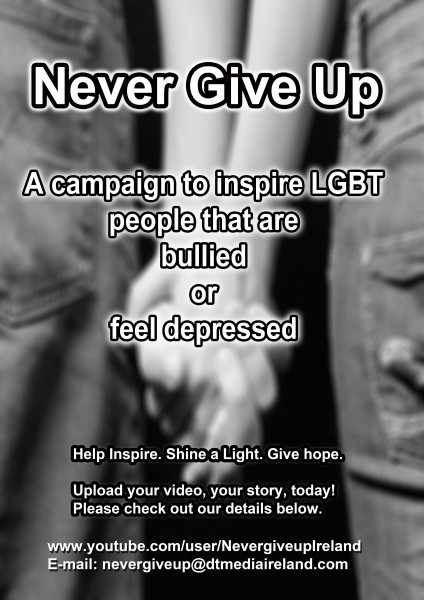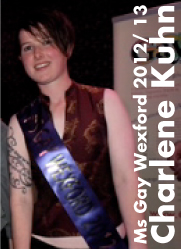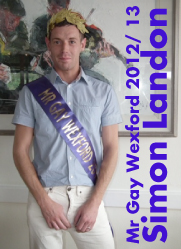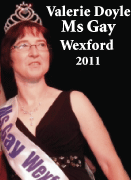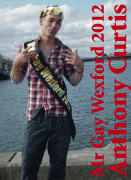.
Let’s talk
-
Recent Posts
- Wexford vigil for Sligo murder victims Aidan Moffitt & Michael Snee.
- Cover • Aidan Moffitt & Michael Snee
- Irish Prides 2019
- Irish Pride 2018
- Waterford Winter Pride Nov 23-26
- Irish Prides 2017
- Summer Solstice 2017• Personal Development • Health & Wellbeing • Day of Yoga
- Waterford Pride 2016 • November 17 – 20
July 2024 M T W T F S S 1 2 3 4 5 6 7 8 9 10 11 12 13 14 15 16 17 18 19 20 21 22 23 24 25 26 27 28 29 30 31 Follow Us
- No public Twitter messages.
-
Tag Archives: Bisexual
All is not well: ground-breaking report shows • LGBTI • March 2016
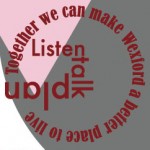
. Media Release: 22nd March 2016 EMBARGO: Midnight 21st March All is not well: ground-breaking report shows higher levels of self-harm and attempted suicide among young LGBTI people The LGBTIreland Report, being launched today … Continue reading
Posted in Coming Out, Wexford, Youth
Tagged (LGBTI), attempted suicide, Bisexual, gay, ground-breaking report, intersex, lesbian, LGBTI people, Professor Agnes Higgins., self-harm, Transgender
Comments Off on All is not well: ground-breaking report shows • LGBTI • March 2016
Never Give Up • Shine a light for LGBT people • bullied, depressed or confused.

Never Give Up is a campaign to shine a light for all LGBT people that may be bullied, feel depressed or confused with life. This Campaign and future Film will demonstrate that life is for living, and no matter how difficult it may become, please Never Give Up, as things can get a lot better for you.
Please make your own inspirational video and send it to us at dtmediaireland@outlook.com or upload it here. Your video should be short, inspirational and showing that life will be better when you never give up on life.
You Tube • NevergiveupIreland
Visible Lives: Older LGBT people in Ireland

The morning of the 3rd of November 2011 saw the launch of Visible Lives (Full report / Key findings), a major new study identifying the experiences and needs of older lesbian, gay, bisexual and transgender people in Ireland.
Those surveyed were aged between 55 and 80 years, and gathered data from around 180 people across Ireland.
Some Key Findings
COMING OUT
35% still fear that friends will reject them if they tell them they are LGBT and
27% are afraid of harassment if people find out they are LGBT
- ■■Most participants went through the whole of their adolescence and early adulthood without disclosing their LGBT identity to anyone and without contact with other LGBT people.
- ■■Participants developed a range of strategies for concealing or hiding their LGBT identity including: cautiousness, discretion, developing divided lives, voluntary exclusion from parts of life, living a ‘straight life’ and even emigration.
“I would have known from a very early age of my orientation but I was cute [clever] enough. In actual fact, it made me very shy and very shrewd. I had the survival skills before I had the knowledge of anything else and I would have watched myself in every area of life and nobody would have known” (Gay Male, 70)
- ■■Participants knew on average at age 20 that they were LGBT, first came out to another person at age 31 and first socialised with LGBT people at age 33. The vast majority are out to at least one person but 7% have not told anyone they are LGBT.
- ■■While the vast majority are now very comfortable with their LGBT identity, 28% are not out to any of their neighbours and 10% are not out to any of their close family.
“You’re hiding all the time. You can’t come out with it. You don’t know what reaction you’re going to get” (Transgender Female, 55)
- ■■While coming out gave people greater freedom to be themselves, it also had varying consequences ranging from acceptance to denial to complete rejection. For some, coming out meant loss of relationships with parents, siblings, spouses, children and friends. Siblings, however, tended to react more positively and supportively, although in some cases siblings, too, rejected the person.
- ■■26% had been married and these participants faced immense difficulties in making the decision to come out to their spouse and children. Those who had children experienced deep struggles prior to coming out to their children and worried that their children would be stigmatised or discriminated against.
28% are not out to any of their neighbours,
10% are not out to any of their close family and 7% have not told anyone they are LGBT
AGEING AS AN LGBT PERSON IN IRELAND
46% live alone, 43% are single and 31% feel lonelier as they age
- ■■In keeping with international literature, the findings of this study support the view that a high percentage of older LGBT people live alone and are non-partnered. 53% are conscious of getting older all the time and 31% feel lonelier as they age.
- ■■Many face barriers to local and LGBT community involvement. Only 54% feel part of their local community and only 50% feel part of the LGBT community.
- ■■Participants worry about isolation and loneliness as they age, particularly those living in rural areas and for those who have not come out.
- ■■A major concern is that older age services will not recognise or respect their LGBT identity. Participants feel concerned that services might not protect their LGBT identity, respect their partners in decision-making or discriminate against them as LGBT people.
- ■■Almost one in four have received poor quality treatment when using healthcare services in Ireland. Of those, 40% consider their negative experience to be related to being LGBT.
“I might be in a relationship but if that doesn’t happen I would like to be in a community that would be supportive, where I didn’t have to hide who I was. I mean I couldn’t imagine being in a nursing home here where I couldn’t be myself…” (Lesbian Female, 56)
- ■■By far the most preferred option for older age accommodation is to live in their own homes. The least preferred option is to live in a nursing home. Some would prefer to live in an exclusively LGBT retirement community or an older age facility that is sensitive and respectful of LGBT needs.
- ■■Only 11% have written a living will and just one in four has given someone power of attorney. 48% have discussed their final wishes with someone and 62% have written a last will and testament.
- ■■Many participants prioritised the importance of determining, recognising and raising awareness of the needs of ageing LGBT people. They emphasised the importance of organisations being more overtly inclusive of older LGBT people.
- ■■Priorities identified for health and social care services included the need for services to be more inclusive, particularly for staff to be aware of and educated about issues for older LGBT people.
One in four are either just about getting by or are struggling financially
LIFE EXPERIENCES
One third are parents and 26% are or had been married
- ■■Half of all participants had been verbally insulted because they are LGBT and almost 20% had been punched or kicked because of their LGBT identity. 25% had been threatened with physical violence and 20% had people threaten to ‘out’ them. 16% experienced domestic violence in their relationships and 7% had experienced sexual violence.
- ■■50% report having no religion compared to only 2% of the general population of the same age. This may be largely attributed to the problematic and troublesome relationships with their Church that many described as the reason for leaving the Church and organised religion.
“Most of my younger life I attempted to be something that I wasn’t. I came to the point of getting married to a woman that was my best friend and I loved dearly and still love dearly, and for 20 years of that marriage we almost succeeded and for three years of that marriage we both went through hell, and the outcome of that situation [telling her] led to a separation about 10 years ago…Well, certainly I needed to do it [come out to wife]. Whatever was the driving force precisely or whatever the judgement of what I did might or might not come from, it was something for my own sanity I absolutely needed to do, but the trouble with it was that every inch of progress I made was another added difficulty for my best friend [wife], who was somebody that I loved very, very dearly. So often the coming out process is very healthy for the gay person; in this particular situation there’s a downside to it, as well as an upside to it, is the simple way of saying it” (Gay Male, 58)
- ■■42% stated they had received poor quality service from civic and community services because of their LGBT identity. The most frequently reported places with poor quality of service in the previous three years were: places of worship (14%), hotels and B&Bs (12%), restaurants and pubs (10%) and shops (7%).
- ■■26% of the survey participants are or had been married. One third are parents. 26% are divorced or separated from a person of the opposite sex.
Only 1 in 5 feel safe holding hands or showing affection with their same-sex partner in public
MENTAL HEALTH AND WELL-BEING
26% are not out to any of their healthcare providers, often because of fears of a negative reaction to their LGBT identity.
- ■75% report that their mental health is good or very good. 33% have had a mental health problem at some point in their lives and one in ten is currently taking prescribed medication for a mental health issue. Only 2% are using mental health services.
- ■■One in ten had seriously thought about ending their life at some time in their lives, while 5% have self-harmed in the past year. Participants’ suicidal and self-harm tendencies were associated with their struggles to come to terms with their LGBT identity or were as a result of the loss of a relationship after disclosing their LGBT identity.
- ■■82% are current alcohol drinkers, with nearly four out of ten consuming alcohol on a weekly basis. 14% are worried about their drinking and 17% drink five or more times a week. Participants report using alcohol to help them cope with shyness around their LGBT identity, to numb painful emotions and to give courage and boost confidence around coming out.
“Even if the health service is not homophobic I would think a very large percentage of the workers in it are not particularly well-informed or intuitive about gay ageing people’s rights” (Gay Male, 59)
- ■■Loss and grief was a significant part of participants’ lives. Nearly one in ten reported surviving the death of a partner or spouse of the same sex and described how their grief was not acknowledged in the same way the death of an opposite sex spouse would be – called disenfranchised grief.
- ■■For some, grief was a consequence of coming out, resulting in loss of contact with children, grandchildren, extended family, and consequently, the intergenerational support that other older people may receive as they age.
- ■■Only 1 in 3 believe healthcare professionals have sufficient knowledge about LGBT issues and only 43% feel respected as an LGBT person by healthcare providers. The lack of services and information on gender identity issues was also highlighted.
73% report good or very good physical health
DEVELOPING RESILIENCE AND COPING
79% report their quality of life as good or very good.
- ■■Despite many adverse experiences participants described an ability to move beyond the negativity, integrate their experiences and embrace their lives in a fulfilling manner.
- ■■There was a sense of pride among participants at being the first real generation of ‘out and older’ LGBT people. They rejoiced at their ability to be true to, or at ‘one with their authentic self’.
- “ We’re resilient…I think the way I’ve coped is about a sense of balance…You need a whole range of different ingredients…You need to mix the different elements to deal with it” (Gay Male, 64)
- ■■Accepting oneself as an LGBT person and remaining positive are critical internal sources of coping and resilience. Peer and professional support, and experiencing accepting relationships with family, friends and colleagues, are important external sources of resilience.
“I often think if I was to go back 15 or 16 years to the way I was, living in the environment I was living in…I was very unhappy…My health would give. I’d be completely stressed out; I couldn’t handle it. So today, I’m totally relaxed and I’d tackle anything. I have no problems and I just am who I am” (Transgender Female, 62)
- ■■LGBT friends are an extremely important source of resilience and coping as these friendships give many participants complete freedom to be themselves and discuss issues that they might not be able to discuss with their ‘straight’ friends.
- ■■For those who have come out to their children, being accepted by their children has helped them cope with rejection from partners, in-laws, other family members and friends.
- ■■Participants took pleasure and strength from seeing a younger generation of LGBT people live their lives in a more open context.
“We are the generation who are giving meaning to being ‘older LGBTs’, so there is challenge, adventure, a degree of excitement and surprise – and tremendous freedom!” (Survey participant)
Posted in Carlow, Elders
Tagged 2011, 3rd of November, 55 and 80 years, 55+, Bisexual, coming out, gay, Ireland, lesbian, older, Transgender, Visible Lives
Comments Off on Visible Lives: Older LGBT people in Ireland
Birds and bees and the such…’Let’s talk about sex.’

Birds and bees and the such…
By David Clarke
Of course there is no such thing as a coming out guide without mentioning the health aspects of playing the birds and the bees game. Let’s talk about sex.
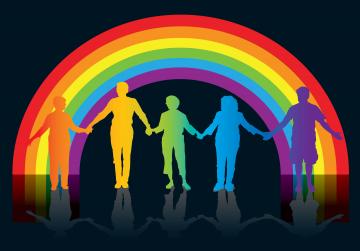 First of all, it’s not who you are it’s what you do.
First of all, it’s not who you are it’s what you do.
Now, the male and the female anatomy have given us advantages and disadvantages when it comes to STIs (sexually transmitted diseases) because due to their bodies men and women have different risks of unwanted and unpleasant consequences of a very pleasant activity.
Boys who have sex with boys have a higher risk of contracting a STI but that DOES NOT mean that girls who have sex with girls are immune to them! Body fluids, such as semen and vaginal fluids can carry viruses which can make you very sick.
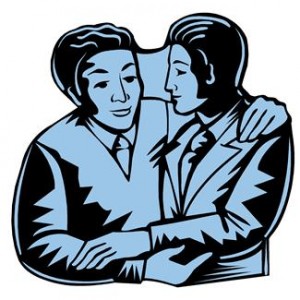 HIV (Human Immunodeficiency Virus) is of course the most known STI and it is still incurable. Once you have contracted the virus, it will always be in your body which means that you can also pass it on to somebody else. HIV can be mainly found in blood, semen and vaginal fluid. HIV can develop into AIDS (Acquired Immune Deficiency Syndrome), a disease that still kills thousands of people in the world every day.
HIV (Human Immunodeficiency Virus) is of course the most known STI and it is still incurable. Once you have contracted the virus, it will always be in your body which means that you can also pass it on to somebody else. HIV can be mainly found in blood, semen and vaginal fluid. HIV can develop into AIDS (Acquired Immune Deficiency Syndrome), a disease that still kills thousands of people in the world every day.
HIV and AIDS were associated with the gay community for a long time because the first group affected were gay men in the US. The first name given to what we know as HIV today was GRID – Gay Related Immune Deficiency.
Since then the picture has changed drastically. Women who have sex with men are one of 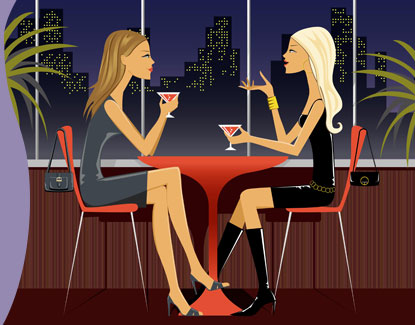 the groups considered at high risk because they can contract the virus easier than men because of their anatomy.
the groups considered at high risk because they can contract the virus easier than men because of their anatomy.
Certain sexual practices carry a higher risk of infection than others with anal penetration being on top, closely followed by vaginal sex. Oral sex is not usually considered high risk but it is not completely safe either. So, girls and boys, be safe in whatever you do for play and pleasure and use those nice condoms and dental dams when you’re fooling round. HIV, Hepatitis C, Gonorrhea, Syphilis, Chlamydia, genital herpes and all those nasty surprises are not a nice thing to have to deal with, so better be safe than sorry.
And enjoy yourselves as much as you can.
David is the youth officer with Gay Wexford and the author of the
coming out guide on the Youth page at GayWexford.com. For more
details of Gay Youth Wexford see their facebook page or send an email
to gayyouthwexford@gmail.com
Posted in GYW, Youth
Tagged AIDS, Bisexual, Chlamydia, female, gay, genital herpes, Gonorrhea, Hepatitis C, higher risk, HIV, Human Immunodeficiency Virus, lesbian, Let’s talk about sex., Male, sexual practices, sexually transmitted diseases, STIs, Syphilis, Transgender
Comments Off on Birds and bees and the such…’Let’s talk about sex.’

 Follow
Follow